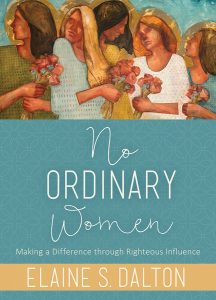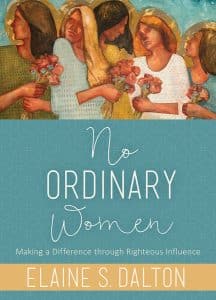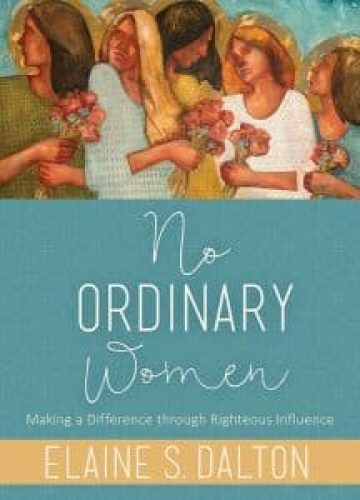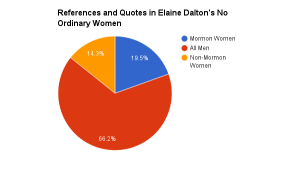Two of our bloggers expressed interest in  reviewing Elaine Dalton’s newest book, No Ordinary Women: Making a Difference through Righteous Influence, so both reviews are included below. Dalton is the former Young Women General President, and a life-long resident of Utah. This is the 3rd book she had has published by Deseret Book.
reviewing Elaine Dalton’s newest book, No Ordinary Women: Making a Difference through Righteous Influence, so both reviews are included below. Dalton is the former Young Women General President, and a life-long resident of Utah. This is the 3rd book she had has published by Deseret Book.
** ** ** ** ** ** ** ** ** ** **
Reviewer 1, Spunky: When I first read Elaine Dalton’s book, I had two thoughts: Who is this book for? And, Yay! She included Australians! In regard to these thoughts, given Dalton’s background and the style of this book, I presume this book is more for young women than for adult women. It has an easy-to-read style that addresses simple principles mostly suited to early teenage women, rather than the complex issues that most women face with adulthood. Plus, the end sections include “small and simple ways” that the reader can set goals to “reflect,” “commit” and “act” that seem stylised toward school-aged women.
Dalton was mindful to include stories from outside of the US, and because I am Australian, I took a keener interest in her thoughts on the Australians she was discussing. It was disappointing that both of the Aussie references were male (F.W. Boreham and Cliff Young), but it seemed that she was better versed in a male-authors given the outpouring of quotes from men that she included in the book. From a masculinity studies perspective, this is where Dalton reigns- she knows the masculine viewpoint well, thus, is found quoting men, yet discussing women.
She does her best to highlight females in the book- including those in her family, Mother Teresa (twice!), Joan of Arc, Sheri Dew and a few others. But her emphasis was mostly on quoting men without too much follow up thought or discussion. For example, I really liked the quote she shared from Paul V. Johnson, wherein he celebrated the births of male general authorities in the year 1940, rather than focusing on the war (celebrate birth rather than emphasizing death). I would have liked it even better if she made her point by adding Mormon women born in 1940, such as Carolee Curtis Green, who was the composer for hymn #8 Awake and Arise. This kind of inclusion would have served two purposes—connecting the message to women, and connecting the message to Mormon women.
She did incorporate some stories about Mormon women, including a short quote from one of my favourites, Belle Spafford. Yet for the most part, the women she seemed to celebrate and discuss in greatest detail –outside of her own family- were not LDS. This was interesting, and yet depressing. Doesn’t Dalton know any successful Mormon women outside of her family? Likewise, I felt that Dalton’s inclusion and focus on Sara Blakely’s product (Spanx) and her repeated gratitude for this invention was in contrast to her message theme to be “not of the world.” Though I appreciated the point Dalton was trying to make in regards to Blakely’s entrepreneurial drive and family background, it still ended up feeling like an exercise in light-hearted self-depreciation aimed at Dalton’s overt gratefulness for Spanx. Dalton made a similar self-depreciating comment in her April 2013 General Conference talk that included a verbal joke about how the face cream she used daily wasn’t working (on the audio only). Self-depreciation is not regarded well in LDS theology (or at least on the LDS.org site), and I didn’t feel familiar enough with Dalton personally to feel like this kind of humour was warranted. Thus, her inclusion of this seemed to be in contrast to the spirit in which she seemed to teach.
It is primarily clear that Dalton values motherhood as the epitome of womanhood. She wrote, “All my life I have been passionate about the role of motherhood.” In this, she tried to include women without children but in terms associated with mothering, including the dreaded “nurturing” term that seems branded on Mormon women, though it is a quality discussed in scripture in association with men (here and here). Indeed, Dalton notes that Mother Teresa “became known as Mother Teresa, although she never gave birth to children of her own.” I think Dalton intended this as a kind of compliment, i.e. Mother Teresa was yet a grand humanitarian even though she never had a baby. But ouch. As an adoptive mother, I am sensitive to the “children of your own,” phrase, so this and other the attempts to include childless women felt sloppy and insensitive. With this in mind, I’m not sure I would choose this as a book for my adopted daughters to read outright, but I see values in some of the sections to use in lesson plans or talks. I strongly do not recommend reading it whole for women dealing with infertility.
In the end, this is a nice read for a lazy afternoon. It is clear that Dalton loves the church and she expresses this love in her words– in many ways, I felt like I was listening to a grandmother speaking to young girls. Parts of the book were reprisals of sections of her General Conference talks, but with greater detail. Thus, there are no grand surprises, nether were there any new insights. It can easily be read in a couple of hours, and does include some nice lists for those who are seeking spiritual goals in a new format.
Bonus: I was given a copy of Dalton’s book via Deseret Book’s Bookshelf app. I don’t live in the US, so I do the bulk of my book-buying on ebay or local booksellers that offer free shipping on overseas titles– including church books. Because of this, I was not aware of Deseret Book’s “Bookshelf.” I love this app. It is excellent, has great free selections (including audio selections for road trips), and sends inspirational daily quotes that I have enjoyed. I highly recommend this app!
** ** ** ** ** ** ** ** ** ** **
Reviewer 2, Nancy Ross: When I took on the assignment of reviewing No Ordinary Women: Making a Difference through Righteous Influence, I wanted to find something good, interesting, and nuanced to write. I wanted to find something hopeful, even if there were lots of issues to wade through. Sometimes I don’t get what I want.
No Ordinary Women reads like a series of short inspirational talks to a younger audience. Those who remember Elaine Dalton’s tenure as Young Women’s General President will remember some of these themes. Part 1 includes three sections titled Act Well Thy Part, He Knows Us, and The Influence of a Righteous Woman. Part 2 contains We Can Do Hard Things, We Are Lead by The Spirit, We Are Disciples of Christ, We Are Covenant Women Who Seek Purity and Virtue, and We Can Change the World.
I was expecting to see the themes of virtue (Dalton’s codeword for virginity, hat-tip to Arwen Taylor’s 2013 Sunstone talk), motherhood, and “doing hard things”. I was hoping that these topics would be presented with many personal stories, the stories of other women, and the teachings of LDS women over the course of the last 180 years. I knew that I would disagree with some of the content – especially with the emphasis and narrow definition of what it is to be a good Mormon woman and mother – but I was hoping for some solid stories of Mormon women. There is some of that in this book, but the text was overwhelmingly comprised of quotes from famous men, LDS apostles and (male) general authorities. In a book that was supposed to be for Mormon women, about Mormon women doing good in the world, and influencing others to do the same, it was low on Mormon women’s voices and stories. I read this and felt a familiar sickening feeling in my stomach that Elaine Dalton wanted me to understand womanhood through the eyes and experiences of men and male church leaders.
I read through the book noting the number of times women, and especially Mormon women, were named or quoted, the number of times men were quoted, and the number of personal stories that Sister Dalton shared. In counting men, I did not include references to Jesus, Heavenly Father, the Holy Ghost, Satan, or Sister Dalton’s husband, as I figured that these would distort the numbers. The pie chart shows that named Mormon women (Sister Dalton’s personal stories plus references to other Mormon women) only make up about 20% of the references to named individuals.
The book covers the themes of her presidency, but does not live up to its stated goal of discussing Mormon women making a difference through righteous influence. Perhaps someday current and former auxiliary leaders will do more to promote the voices and experiences of Mormon women, to showcase the variety of women’s lived experiences and roles, to point to the many (Mormon) women working make the world a better place. Not today.





6 Responses
Thank you both for this review. I especially like the vividness of the pie chart. Ugh! It’s unfortunate that our tradition has such a hard time seeing women as authoritative on anything, not even on how to be a woman.
The pie chart says it all. Another book where women get mansplained through a female mouthpiece quoting the dude bros.
Exactly. [my grumpyface is on]
You know what’s crazy? If someone actually wrote a book about Mormon women changing the world, I’d read the hell out of it.
I would read the hell out of that too. And post quotes from it on Facebook, take photos of myself reading the book, make my children read it, and then organize a Sunstone panel to discuss it. I would reference it in my professional work and tell everyone about it all of the time. But apparently we can’t celebrate Mormon women doing wonderful things in the world. We can only erase them.
The truth of this is heartbreaking.